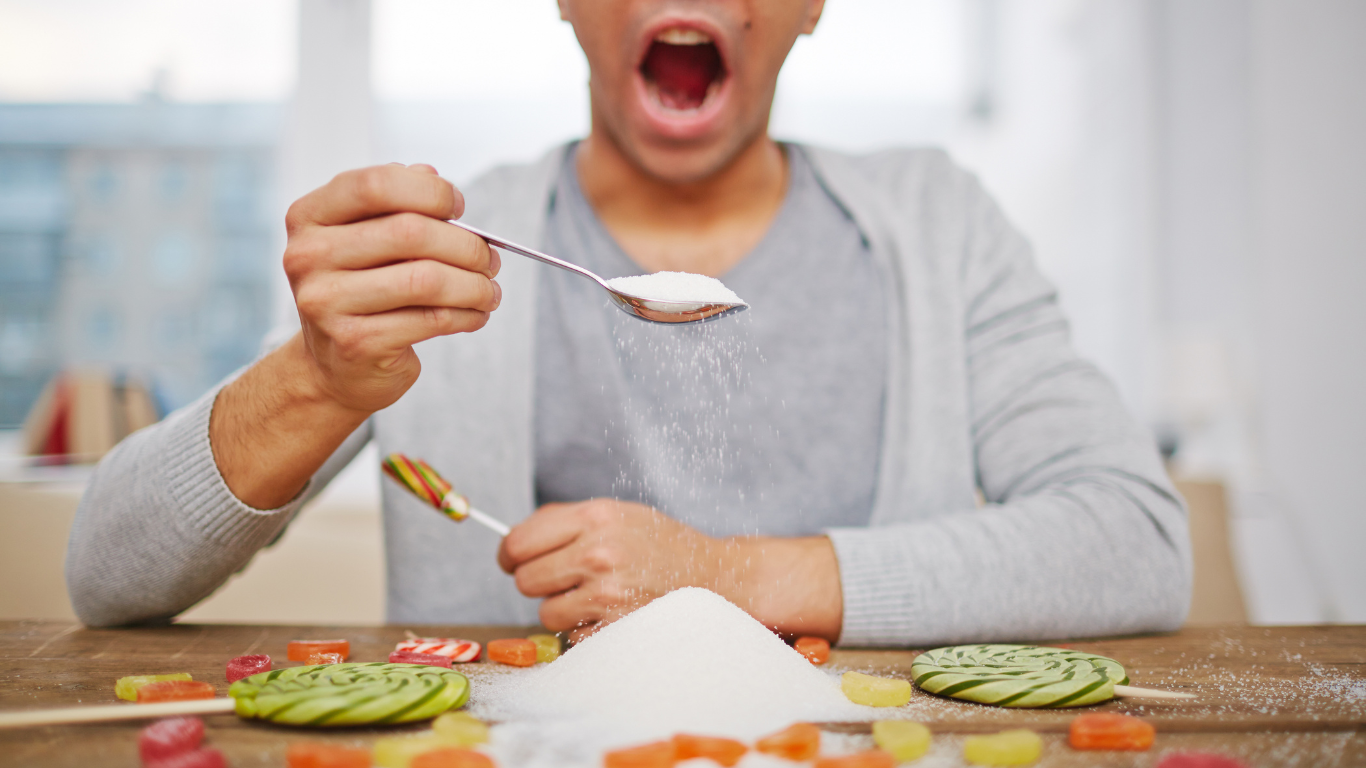
In 1984, Ben & Jerry introduced cookie dough ice cream, marking the beginning of a sweet revolution. The delectable combination of cookie dough and ice cream instantly won over many hearts, including mine. So much so, that I found myself forgoing the ice cream altogether and indulging in straight cookie dough, savoring the best part. However, this decision didn’t end well, as I soon found myself overindulging in raw cookie dough. Can anyone else relate to this story? If so, you are not alone. In this blog, I will address the issue of sugar addiction and provide actionable steps to break free from its grasp.
The Evolution of Sugar Consumption:
Our love for the taste of sweetness has deep evolutionary roots. Historically, sweet tastes were associated with high-carbohydrate and calorie-rich foods, essential for survival and energy production. This preference may have also signaled the safety of certain foods.
Interestingly, for the majority of human existence, estimated at around 200,000 years, sugar consumption, especially in refined form, was virtually nonexistent. However, in the past couple of centuries, there has been a dramatic shift. Today, sugar is pervasive in our diets, present in breakfast cereals, sodas, snacks, and numerous other products. On average, we consume 17 teaspoons of added sugar per day, far exceeding what our ancestors ate and what our bodies have adapted to handle.
Recognizing Sugar Addiction:
If you find yourself lacking control over your sugar intake or constantly thinking about sugar, know that you are not alone. Sugar addiction is a real condition that affects many people. Let’s delve into why sugar may have such a grip over us and explore the steps we can take to loosen its hold.
Understanding Sugar Addiction:
Sugar triggers specific responses in the brain, leading to addictive behaviors. Here are a few key factors:
Dopamine release: When we consume sugar, dopamine is released in the brain, associated with pleasure and reward. The more sugar we eat, the more dopamine is released, creating a cycle of craving for that same pleasurable experience.
Opioid-like effects: Sugar can produce effects in the brain similar to opioids, notorious for their addictive properties. The brain’s receptors can be stimulated by sugar, contributing to addiction.
Insulin spikes and crashes: High sugar intake leads to blood sugar spikes, prompting the release of insulin to regulate levels. However, excessive sugar consumption can result in insulin resistance, causing blood sugar crashes and subsequent cravings for more sugar.
Disruption of neurotransmitters: Sugar can disrupt the balance of neurotransmitters in the brain, such as serotonin and GABA, further fueling cravings and addiction.
Combatting Sugar Addiction:
Now that we understand the mechanisms behind sugar addiction, let’s explore actionable steps to overcome it:
Diet: Begin by altering your diet and reducing sugar intake as much as possible. Cut out empty calories and focus on consuming protein, fiber, and healthy fats.
Exercise: Regular physical activity releases endorphins, which help manage stress and reduce sugar cravings. Additionally, exercise helps regulate appetite, an essential aspect of controlling sugar addiction.
Mindfulness Techniques: Incorporate mindfulness practices like meditation, tapping, hypnotherapy, or grounding to gain awareness of triggers that lead to sugar cravings. Develop strategies to overcome these triggers effectively.
Prioritize Sleep: Ensure you get enough sleep each night (7-8 hours) to control sugar cravings. Sleep deprivation can cause the body to seek quick energy sources like sugar.
Supplements for Support: Certain supplements can aid in controlling sugar addiction. Consider adding these to your routine:
Chromium: This mineral helps regulate blood sugar levels and reduces sugar cravings.
Magnesium: Known for its stress-reducing properties, magnesium can help alleviate triggers for sugar cravings.
L-glutamine: This amino acid supports gut health and helps reduce sugar cravings.
Probiotics: Consuming probiotics like apple cider vinegar can help maintain a healthy gut, positively impacting sugar addiction.
Conclusion:
Remember, it is possible to occasionally enjoy high-sugar treats without triggering addictive behaviors. By focusing on diet and lifestyle habits that support your goals, your sugar cravings will gradually weaken, allowing you to live a healthier life. Take charge of your sugar addiction, and let your well-being thrive.
About the Author:
Ms. Bonni London is a Registered Dietitian with a 30-year career dedicated to assisting individuals in achieving their weight and health objectives. Having overcome personal challenges in her own journey, she possesses a strong passion for sharing uncomplicated and impactful strategies that can greatly influence maintaining a desired weight, attaining optimal health, and experiencing a high quality of life.

Precommitment: The Secret to a Healthier You
Reconsidering Sugar Alternatives: A Healthier Approach to Cutting Calories

